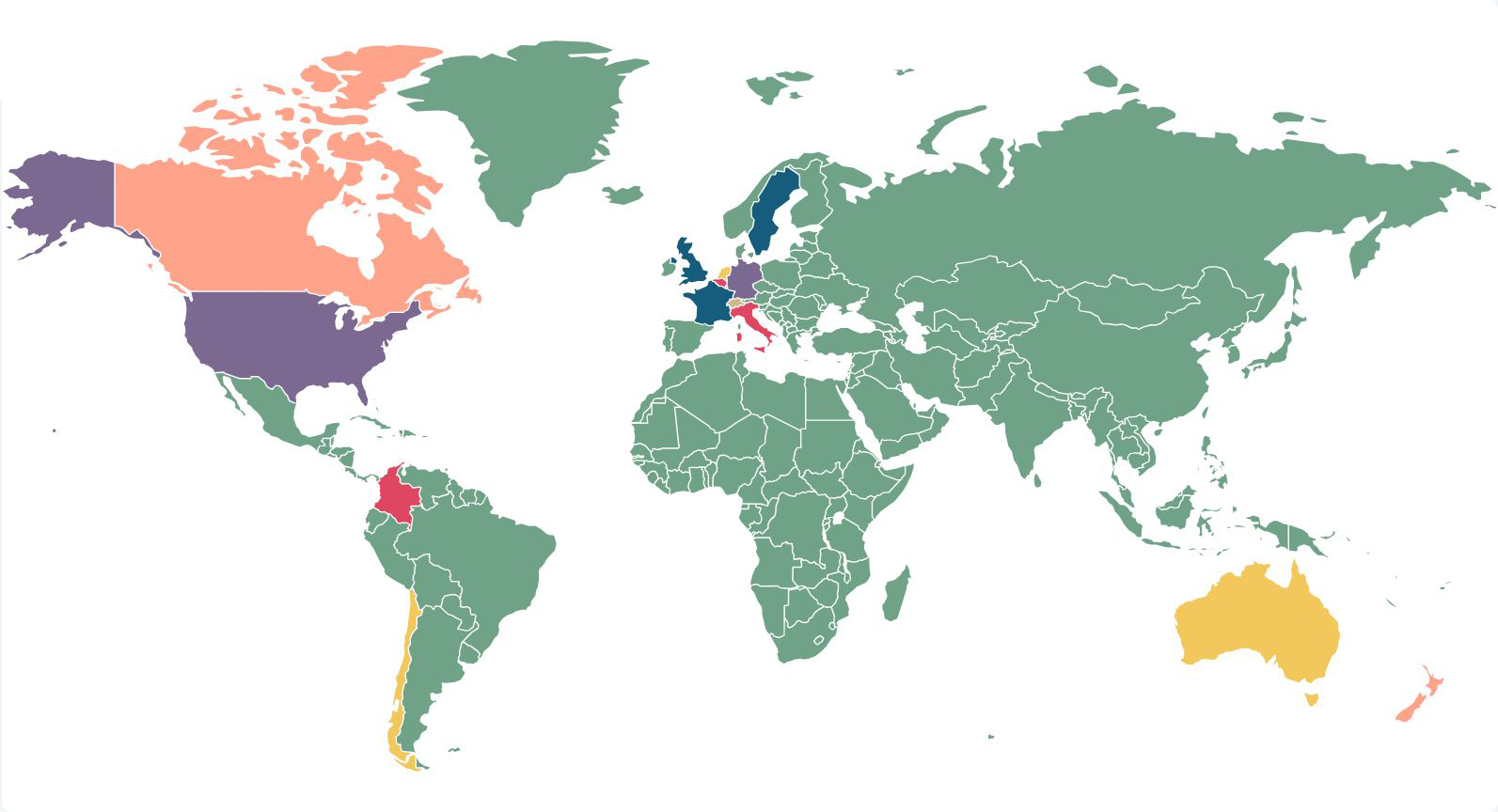The insurance industry is now at the heart of the race to meet the challenge of climate change. As the COVID-19 pandemic recedes, it is climate change at the top of the global political agenda with Environmental, Social and Governance (ESG) strategies becoming essential for financial institutions.
Around the world, governments, insurers and regulators are talking about how to respond to the wide-ranging threats climate change and global warming pose. Many of these were recently highlighted in the Climate Change Committee’s Independent Assessment of UK Climate Risk in June 2021.
Market engagement
There is a tangible change of mood, says Denise Eastlake, Head of the Climate Change Desk at DAC Beachcroft in London: “There is an all-pervasive feeling that surrounds this issue at the moment. It is a huge change. Everybody is talking about it and the market is hugely engaged.”
It is not hard to see why. As risk carriers, insurers face enormous pressures to withdraw from underwriting fossil fuel risks while developing fresh capacity for renewables. As major institutional investors, they find themselves identified as key players in the growing focus on sustainable finance, a key topic for the re-scheduled United Nations COP26 (Conference of the Parties) in Glasgow in November.
The arrival of Joe Biden in the White House is another game-changer, says Carl Pernicone, Partner at Wilson Elser in New York, as it brings the USA back to the table after Trump pulled it out of the Paris Accord.
“Biden sees himself as another FDR [Franklin Delano Roosevelt, who led the 1930s New Deal], our most progressive president, but he doesn’t have the same political strength. FDR had big majorities in Congress. Biden’s are wafer thin and could disappear in the 2022 mid-term elections. If he doesn’t act boldly now on climate change, which he says is an existential threat, then he may lose the ability to act at all.”
Connectivity with ESG issues
One feature of the renewed urgency across the global insurance industry to address the impacts of climate change is the connectivity with other ESG issues, powerfully illustrated by the impact of flooding, says Eastlake.
“For insurers it is not just the environmental impacts but the social impacts that need to be taken into account. For instance, Flood Re has said that the largest group of people affected by flooding in poorer areas are tenants as they don’t have the contents insurance and they don’t get the alternative accommodation. So, if you look at climate you have to look at social impacts and the protection gap.”
The growing gap between what the insurance industry covers and the full economic loss surfaced as a major concern in Canada after the severe floods in Alberta in 2013, says Scott Harcus, Partner with Alexander Holburn in Vancouver.
“Flooding has become a major concern in Canada after the C$6bn loss in Alberta. There has been real interest at federal government level in creating a national flood scheme.”
Insurers’ response
Insurers have responded well to the wider social and humanitarian impacts of severe flooding and hurricanes, a global phenomenon as temperatures continue to rise. Building resilience has been a key theme of that response.
The Z Zurich Foundation has an ambitious programme aimed at helping four million people in 200 communities across 14 developing countries by 2024.
“The Zurich Flood Resilience Alliance connects with people and organisations familiar with the situation of individuals in need, to build better understanding of how the risks facing the wider community interrelate. The aim is not only to educate these individuals on how they can better protect themselves from the consequences of natural hazards but also to help them find alternative sources of income,” says Gregory Renand, Head of the Z Zurich Foundation.
The Z Zurich Foundation has a wide range of projects running and DAC Beachcroft is proud to be supporting two key initiatives: one is in Chile, advocating for better flood planning; while another in Europe is assisting with the development of innovative tools to use data better to understand flood risk.
Climate change litigation
While these projects looking to the future are gathering pace, the consequences of earlier generations of pollution and carbon emissions are now hitting the courts, nowhere more so than in America.
“The real fight here is over where these cases should be litigated. The Exxons, the Chevrons and the like want to take these cases into the Federal Courts because they think that in a Federal Court forum they will get a more sympathetic hearing. If they are litigated in state courts you could get conflicting, divergent views on an issue that has national implications,” says Pernicone.
Typical of these cases, often brought by municipal authorities looking to recover the costs of mitigation, is one involving New York City and ExxonMobil.
“The lower court said the issues surrounding greenhouses gases and climate change are national concerns and that it wouldn’t be right to hear them in state courts as they could come to contradictory decisions.”
This case and one that originated in Baltimore are now hovering between state and Federal Courts and could eventually find their way to the Supreme Court. Even that will not be the end of the story, says Pernicone.
“I would not be surprised if the Supreme Court rules that national energy policy should not be decided by the Supreme Court but by the elected branches of the federal government - President Biden and Congress.”
In Canada, similar issues are being debated, says Harcus, where human rights legislation is being used to try to establish liability for the impacts of pollution.
“We are seeing actions in courts against the government for not taking a tougher line to reduce carbon outputs more aggressively. These have made some progress, with the courts accepting that the issues are within their jurisdiction.”
In Europe, cases have made more progress. In May, a landmark case brought by Friends of the Earth and backed by more than 17,000 claimants saw a court in The Hague order Royal Dutch Shell to cut its global carbon emissions by 45% by the end of 2030 (compared to 2019 levels). The company was also held responsible for emissions from its customers and suppliers. The company’s activities were held to constitute a threat to the right to life and the right to undisturbed family life as set out in the European Convention on Human Rights and its sustainability policy was found to be insufficiently concrete. This unprecedented ruling will have significant implications for the energy industry and beyond, as it has galvanised campaigners looking for effective ways of holding the global fossil fuel industry to account.
The debate about the impact of pollution on individuals took a new turn when air pollution was recognised as a cause of a person's death in the UK in December 2020. Southwark Coroner's Court in London found that it "made a material contribution" to the death of nine-year-old Ella Adoo-Kissi-Debrah. She had lived near the South Circular Road in Lewisham and died in 2013 following an asthma attack.
“That resonated significantly with larger local authorities who are looking hard at their traffic policies,” says Eastlake.
It was cited by Birmingham City Council as one of the reasons for introducing tough controls on city centre traffic in the summer of 2021. They do not want to be taken to court and have firmly positioned themselves alongside anti-pollution campaigners despite the fierce protest of the powerful road lobby.
Shareholders have also not been slow to enter the climate change fray in 2021, with both ExxonMobil and Chevron suffering major shareholder revolts over their alleged failures to set out tough, coherent policies to secure a low carbon future.


Pressure will grow
As the pressure from the courts and shareholders ramps up on the big polluters, insurers will find themselves in the firing line.
“Insurers have to understand that they could also become liable. Their policyholders and shareholders will increasingly say this is an issue for you too,” says Eastlake.
Climate change campaigners certainly see insurers as major targets in their intensifying battle to rid the world of its dependence on the most polluting fossil fuels. They argue that if insurers stopped insuring and investing in the big polluters, the world would be able to hit the most ambitious targets for reducing carbon emissions much faster.
The leading campaign group, California-based Insure Our Future, armed with increasingly sophisticated data and information on insurers and brokers involved, is targeting insurers to pull out of underwriting and investing in key projects. Top of its list of priorities is the Adani coal mine project in Australia and the Trans Mountain oil sands pipeline in Canada (see box).
It is also lobbying regulators to be even tougher in the pressure they are putting on insurers to be more rigorous in assessing their contribution to global warming, as the new round of stress-testing of climate impacts gathers momentum. Regulators are listening to these demands as they know they are accountable to politicians who want big wins on climate change.
In a letter to the European Commission at the end of May, Insure Our Future set out its agenda:
“In recent years, many leading insurance companies have reduced their exposure to coal and other fossil fuels. Currently, at least 26 major insurers have restricted insurance services for coal, and at least 70 have divested from the coal industry or ended new investments in the sector. 11 insurers have restricted underwriting for oil sands projects, yet only one company has ended cover for all new oil and gas production.
“It is very clear by now that voluntary actions alone are not enough. The (re)insurance sector needs to be better regulated to properly account for its investments in fossil fuels, for the climate and financial risks created for society and for the companies themselves.”
It urged the Commission to use the review of Solvency II to penalise all fossil fuel investments with the highest possible capital charge and to take a broad view of the potential losses from underwriting fossil fuel projects.
“Exposure of (re)insurance companies to new fossil fuel exploration and production should take account of the significant risk such activities create for societal financial stability. When calculating obligations arising from policies covering new fossil fuel exploration and production – a very high, or 100%, loss should be assumed. In addition, a capital charge of 100% should apply to any equity and corporate bond investments in new fossil fuel assets.”
These demands will find their way onto the agenda for COP26 where former Bank of England Governor Mark Carney is convening the workstream on sustainable finance. He is likely to be sympathetic to setting clear disclosure requirements and tough targets for the insurance industry.
“His focus is all about disclosure,” says Eastlake. “He says what you can measure you can manage.”
Insurers and brokers need to ready themselves for that challenge.
Oil sands project presses for secrecy
In a move that looks to go against the general direction of travel for global regulation, the Canadian energy regulator in April agreed with the Canadian government that the names of insurers and brokers should be withheld from regulatory filings for the controversial Trans Mountain oil sands pipeline project.
This project was taken over by the Canadian government in 2018 when the private developer, Kinder Morgan, pulled out because of the huge public controversy. Several insurers, led by Zurich, have already pulled out; with others set to follow, the government pressed for non-disclosure and won.
“There were concerns that if insurers were disclosed that eventually it would be difficult to obtain insurance for the project,” says Harcus.
“The test was a low bar as you only have to show that there could potentially be a financial loss. It is a narrow ruling in relation to a regulatory filing and it is not clear whether insurance cover could be disclosed in another way.”
It may, however, be a pyrrhic victory for the government. Within a month of the ruling, Lloyd’s of London syndicate Argo Group pledged to cut ties with the existing Trans Mountain oil sands pipeline when its current insurance policy expires on 31 August 2021, and not to insure any aspect of the Trans Mountain Expansion Project.
Lloyd’s looks to a sustainable future
Lloyd’s has brought together leaders from several major global insurers and brokers to form an Insurance Task Force as part of the Prince of Wales’ Sustainable Markets Initiative. It has set itself a series of objectives, including launching at least two insurance products to support clean energy projects, developing a sustainable insurance supply chain and helping direct investment towards sustainable projects in collaboration with the public sector. Its launch Letter of Intent makes no mention of fossil fuels and how the industry might respond to the growing pressure from climate change campaigners to withdraw support for them, although Prince Charles clearly has high hopes for the overall project.
“The insurance industry is exceptionally well placed to understand the impact of climate change and the damage it can cause to us all if we don’t take action now. This is why I am so pleased that a large number of the world’s leading insurance companies have joined together to identify how the insurance industry can help put nature, people and the planet at the heart of our entire economy,” said the Prince at the task force launch.














